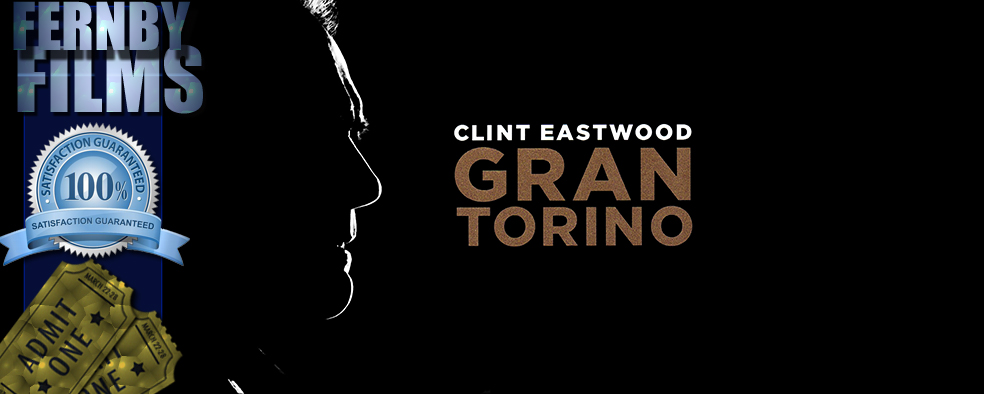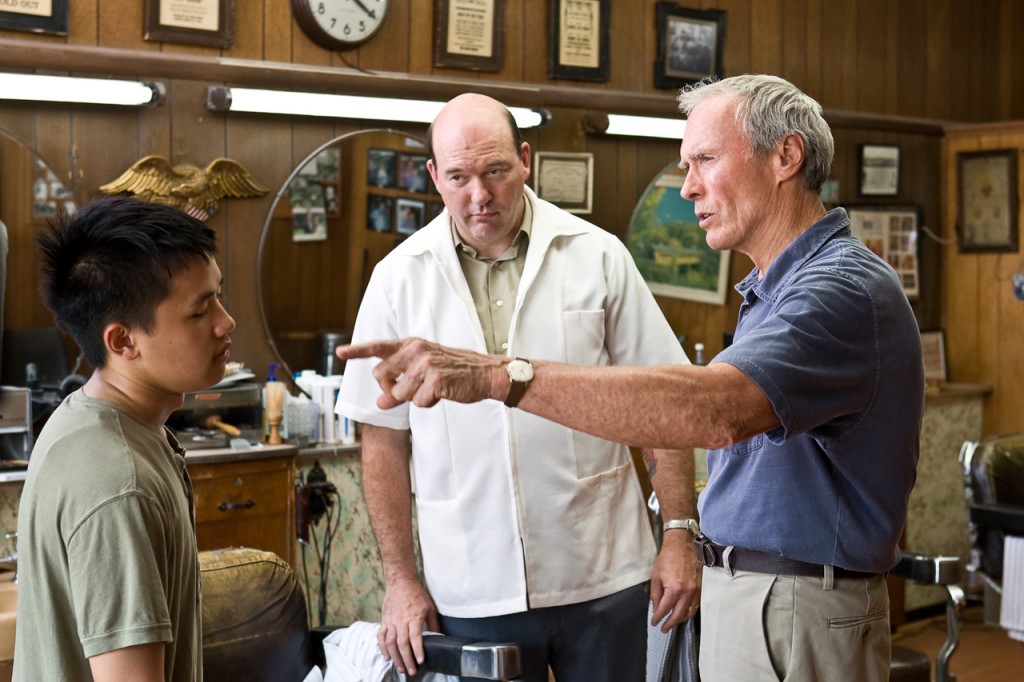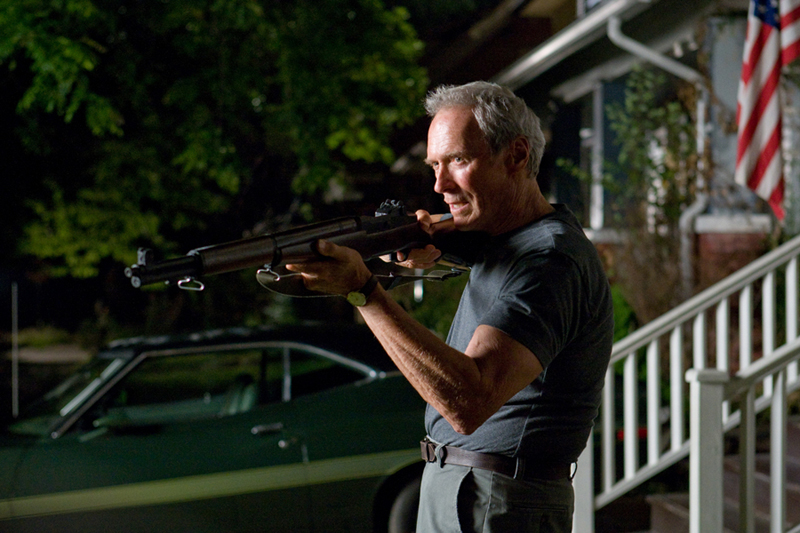Movie Review – Gran Torino
Dynamite performance from Eastwood, as well as a cast of relative unknowns, takes this moral, ethical fable and transports it into reality, a biting social commentary on the changes in our society. Superb direction from a man at the peak of his storytelling power.

– Summary –
Director :Clint Eastwood
Cast : Clint Eastwood, Christopher Carley, Bee Vang, Ahney Her
Length : 120 Minutes
Synopsis: A racist, bitter old war veteran has to learn to deal with his Vietnamese neighbors, and the gang violence that threatens his way of life. When a young Asian boy is forcibly invited to join a neighborhood gang, this sets in motion a chain of events that will lead to salvation, and retribution.
Review : Dynamite performance from Eastwood, as well as a cast of relative unknowns, takes this moral, ethical fable and transports it into reality, a biting social commentary on the changes in our society. Superb direction from a man at the peak of his storytelling power.
*************************
It has been rumored that this film represents the last time Clint Eastwood will step before the cameras and act. I, for one, am upset with that, if this is the caliber of his work right now. Mr Eastwood has been around the Hollywood system for a very long time, and no doubt could have become the same jaded non-creative clone that many of his contemporaries have appeared as. Eastwood, however, has managed to carve himself a niche career as both a celebrated actor, and award winning director, including recent successes with Mystic River, Flags Of Our Fathers and Million Dollar Baby. Now, with Gran Torino, Eastwood returns to the screen with one of his most powerful performances yet: and the guy is in his 80’s! Incredible. Like a fine wine, Eastwood keeps getting better with age, although I suspect it’s got more to do with his canny ability to cast himself in roles suited to his persona than to stretch himself beyond the hard-boiled alpha male material he made his name with back during the 70’s, in films like Pale Rider and The Outlaw Josey Wales.
Gran Torino, set in present day Detroit, tells the story of Walt Kowalski (Eastwood), a retired car assembly worker and veteran of the Korean War, who is increasingly isolated from society by a mixture of bigotry, racism and skewed patriotism; his adult children are almost strangers to him, and as the film opens, we find Walt has just lost his wife, attending her funeral and snarling through the eulogy given by the priest. In Walt’s neighborhood, he’s gradually becoming surrounded by Asian residents, particularly the Hmong community, a group of people from Vietnam who have come to America to make a better life for themselves. Walt resents this Asian presence, his experiences in Korea making him bitter to a people who he once considered to be the enemy. Unlike most people, however, Walt let’s them all know he hates them, a steady stream of abuse and insults flying from his lips as he seeks to instill in them his fierce sense of patriotic pride in being an American born citizen, not some wannabe immigrant with little to offer. Walt is extremely counter cultural, resenting their lifestyle, their customs, their looks.

When Thao (Bee Vang), the next door neighbor’s kid, attempts to steal Walt’s prized 1972 Ford Gran Torino from his garage, as part of a gang initiation, Walt initially threatens the young boy with all kids of unpleasantness, however, Walt soon sees that Thao is a soul who can be saved from a life of crime and violence, and begins to mould him into a respectable member of the community. Thao’s sister, Sue (Ahney Her) also jibes banter with Walt, appearing unafraid of the elderly man’s seeming belligerent attitude to her people and family. The tension between Walt and Thao, and the gang who want Thao to become part of their group, is palpable and realistic, with the young lad even given a start at a job by Walt, which leads to even more violent confrontations from the gang.
Walt, who see’s in himself Thao’s salvation, cannot bring himself to stand by and watch the young boy indoctrinated into the gang, decides to take matters into his own hands, using his magnificent violent streak to it’s best potential to intimidate, threaten, and ultimately, destroy the gangs power in the community. It’s a revelatory performance from Eastwood, one I felt beyond him, but am glad to say he gave me cause to change my mind. Eastwood channels hard-ass so well it’s almost become synonymous with his screen persona; I’ve read many an interview with Eastwood where the interviewer has described him as softly spoken, affable and utterly unlike the many character’s we’ve come to know and love to which he’s given so much authority. The famous Eastwood Glare, that squinting, death stare he gives when he’s deadly serious and about to blow somebody away, makes several appearances in this film, and with Eastwood telling some of the gang members he’ll sleep like a baby after he’s shot them in the face, you get the impression he means every word. Whether it’s snarling down the barrel of a gun, or simply engaging in conversation, Eastwood delivers each line with the authority of a man bereft of conscience and care.
Walt is a force of nature; he doesn’t go to church and detests his priests constant home visits to check on him (at the instruction of his late wife), he can’t seem to communicate with his two sons, and his grandchildren are an embarrassment to him, with their crass dress sense and inability to show respect, so he treats them all with the disdain he thinks they deserve. Walt is a man most of us would detest in real life, if we ever met somebody like him. Sure, we’d probably forgive his overt racism and bigotry due to either his age or past effort in war, however, we’d be unable to look past this anger and unjustified (and somewhat unqualified) hatred of those different than himself if we actually encountered Walt Kowalski. In Gran Torino, Eastwood manages to skirt the reasons we’d like to abhor this bigot and instead, allow us to actually care for him, begrudgingly, almost manipulatively, since the film skews out view of him to the positive by portraying his family and friends as utter wankers, people who are morally and ethically shallow and without redeeming feature: this makes it easy for us to see Walt’s perspective. And while perhaps morally objectionable in itself, we sense an undiscovered fortitude of character that allows us to juxtapose what Walt stands for for what he’s about to do. Walt’s tortured soul, a man who’s been to hell and back in war, is all too evident when espousing his wisdom to Thao later in the film, telling him that killing a man is about the worst thing you can do, and how it destroys your very soul. Thao, at that stage in blind rage due to the gangs’ assault of his sister Sue, barely listens, but the words come back to haunt us at the film’s conclusion, a sublime about-face of justice, redemption and salvation, as Walt stands face to face with the gun-toting gang members, his steely resolve bringing down upon them a thunder of retribution that nobody has yet foreseen. Sometimes, it seems, the appearance of violence begets actual violence, and the result is tragically heroic: at least, that’s the way it comes across here.

There are many analogous representations of today’s society within Gran Torino, none more outstanding than Eastwood’s scene with three street hoods, who rough up Sue and a young white kid who is on a “date” with her. Eastwood, driving his regular white pickup, arrives on the scene. So, he tells the three hoods, you know how you meet somebody in your life that you wish you’d never f***ed with? The three hoods stand there, nonplussed that such an old man would even contemplate talking to them that way. Well, Walt continues, that’s me. Walt pulls a weapon on the three hoods, saves Sue and tells her “boyfriend” to scram. A delicious scene, replete with humor and a dark sense of justice, since no doubt we all wish we could do that when we see wrong being done. How many of us simply stand by and watch evil unfold, without doing anything? Walt doesn’t. He goes into bat for the little guy (or, in this case, the little girl) and comes out the other side, still bitter, but slightly fulfilled. Perhaps it’s his sense of moral outrage at the breakdown of society that feeds his anger. Whatever it might be, this really is one guy you do not want to mess with.
The performance of the largely unknown cast is superb, although Bee Vang as Thao radiates a somewhat uncomfortable-ness with cinema that undermines what could have been a really great role: his moment to shine, when locked in Walt’s basement by a vengeful Eastwood, isn’t as powerful as it needed to be. Vang lacks the subtle nuances of a more seasoned actor, he’s wooden compared with the luminous performance of his on-screen sibling Ahney Her, as Sue, who shines in her dialogue with Eastwood. The rest of the cast, including Christopher Carley as the young priest Walt confides in and berates in equal measure, are well played, even if the bulk of the film is spent focusing on Walt, Thao and Sue.
Eastwood directs with a superb feel for the material, neither downplaying the severity of it, or overdoing his hand. Honed from decades in the industry, Eastwood knows what works for an audience, and he uses this simple, elegant storytelling technique to advance the film rather than try and overwork it. Simple editing, a great sense of place and style, and Eastwoods uncanny portrayal of a man with no simple redeeming feature, make Gran Torino a truly extraordinary film that will stay with you long after it’s finished. If this truly is Clint Eastwood’s last hurrah as an actor, then he’s gone out on a winner.


 The Wolverine (2013) vs. The Karate Kid, Part II (1986)
The Wolverine (2013) vs. The Karate Kid, Part II (1986)

